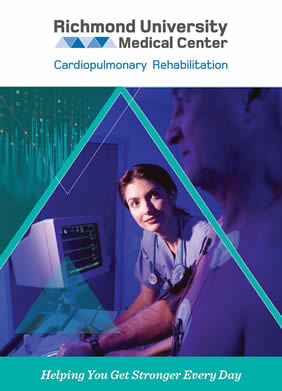Cardiopulmonary Rehabilitation at Richmond University Medical Center
Richmond University Medical Center’s Cardiopulmonary Rehabilitation Center is staffed with medical experts operating exclusively with your unique needs in mind, this outpatient medical facility is designed to provide cardiac and pulmonary rehabilitation services to patients seeking to address heart troubles or recover from heart-related surgical procedures.
The facility’s all-in-one design allows patients an opportunity not only to improve their cardiopulmonary health, but to maintain good health over time with help from the center’s seasoned team of medical experts. Cardiac rehabilitation can revolutionize your everyday life, helping you improve your diet, lose weight, enhance your everyday functionality and return to work and family life with as little interruption as possible.
Who needs a cardiac rehab program?
Patients of any age who have been affected by heart conditions can benefit from a strategically designed cardiac rehabilitation program. Our Cardiopulmonary Rehabilitation Center may be right for you if you have experienced:
- Acute myocardial infarction within the preceding 12 months
- Coronary artery bypass surgery
- Current stable angina pectoris pacemaker/implantable cardioverter defibrillator (ICD) surgery
- Heart valve repair or replacement
- Percutaneous transluminal coronary angioplasty or stenting
- Heart or heart-lung transplant
- Heart failure – stable on optimal medical therapy for at least 6 weeks
What happens in a cardiac rehabilitation program?
Rehabilitation programs are designed to help you alter your lifestyle habits in order to promote positive change and a smooth recovery process through exercise and other healthy habits. They are especially helpful for people who have recently gotten out of the hospital and want to instill healthy lifestyle adjustments as they transition back to their day-to-day activities.
Most cardiac rehabilitation programs involve the following steps:
- A thorough medical evaluation to determine your capabilities, as well as your personal limitations. Your medical professionals will carefully craft a program based on these results.
- Participation in regular aerobic exercise and strength training guided by your progress and needs. Exercise will start slowly and gradually increase in intensity based on your growing abilities.
- A healthcare professional who will monitor your progress, including vital statistics, like heart rate, blood pressure and EKG, as well as changes in symptoms, and note essential changes as you progress through the program.
- The opportunity to advance into programs that allow more frequent and vigorous exercise.
After you have wrapped up your cardiac rehab program, it is essential to incorporate the knowledge and habits you gained into your everyday life to help safeguard your heart from future medical complications.
How else can cardiac rehab programs help me?
The typical cardiac rehabilitation program is designed to improve heart health, but most programs deliver a range of additional benefits alongside the program’s primary goal. These benefits may include:
- Smoking cessation support and education to encourage a smoke-free lifestyle.
- A healthy eating plan that prioritizes nutritionally sound choices and foods low in cholesterol, saturated fats, and trans fats
- A higher level of physical fitness due to improved food and exercise choices.
- Knowledge of key weight loss methods to help you maintain a healthier weight.
- Relaxation and stress management techniques to promote greater wellbeing.
- Supportive relationships with individuals who share a similar cardiac health history.
What is pulmonary rehabilitation?
Pulmonary rehabilitation is a process that seeks to improve lung health. The process bears many similarities to cardiac rehab, especially in the use of exercise to help improve your lung condition. Throughout your pulmonary rehabilitation program, you will typically attend classes alongside others with similar health conditions, which can create a sense of community that may be comforting. You will also gain knowledge and skills designed to help you manage your lung disease. The most successful pulmonary rehab programs help bolster fitness and could even reduce the demand for future hospital visits.
Is pulmonary rehabilitation right for me?
Despite its many benefits, pulmonary rehabilitation is not suited for everyone. Patients with lung disease who frequently deal with shortness of breath and difficulties performing everyday activities, even with medication, may not be the right fit for a pulmonary rehab program. With that said, patients diagnosed with Chronic obstructive pulmonary disease (COPD) and a variety of additional chronic lung conditions may benefit from such programs. Your doctor can evaluate your current pulmonary health and advise the best course of treatment for your specific condition and desired outcomes.
Contact RUMC Today
Rehabilitation programs can provide life-changing benefits for patients from all walks of life with a wide range of health needs. To learn more about Richmond University Medical Center’s cardiopulmonary services, contact us today (718)-818-2515




